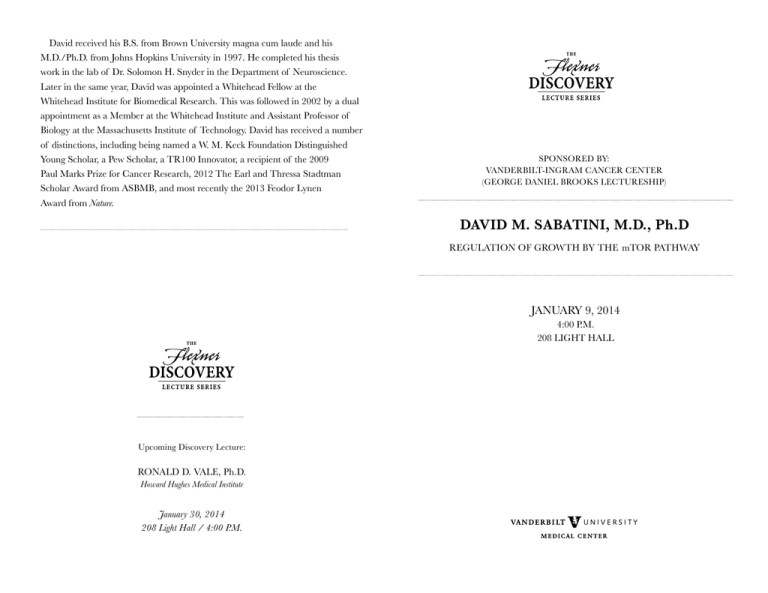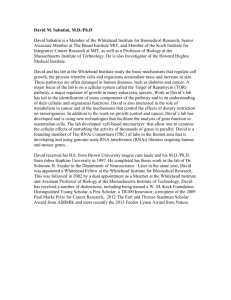david received his b.S. from brown university magna cum laude... m.d./ph.d. from Johns hopkins university in 1997. he completed his...
advertisement

David received his B.S. from Brown University magna cum laude and his M.D./Ph.D. from Johns Hopkins University in 1997. He completed his thesis work in the lab of Dr. Solomon H. Snyder in the Department of Neuroscience. Later in the same year, David was appointed a Whitehead Fellow at the Whitehead Institute for Biomedical Research. This was followed in 2002 by a dual appointment as a Member at the Whitehead Institute and Assistant Professor of Biology at the Massachusetts Institute of Technology. David has received a number of distinctions, including being named a W. M. Keck Foundation Distinguished Young Scholar, a Pew Scholar, a TR100 Innovator, a recipient of the 2009 Paul Marks Prize for Cancer Research, 2012 The Earl and Thressa Stadtman Scholar Award from ASBMB, and most recently the 2013 Feodor Lynen Award from Nature. Sponsored by: vanderbilt-ingram cancer center (George Daniel Brooks Lectureship) David M. Sabatini, M.D., Ph.D Regulation of Growth by the mTOR Pathway January 9, 2014 4:00 p.m. 208 Light hall Upcoming Discovery Lecture: Ronald D. Vale, Ph.d. Howard Hughes Medical Institute January 30, 2014 208 Light Hall / 4:00 P.M. Regulation of Growth by the mTOR Pathway mTOR is the target of the immunosuppressive drug rapamycin and the central component of a nutrient- and hormone-sensitive signaling pathway that regulates cell growth and proliferation. We now appreciate that this pathway becomes deregulated in many human cancers and has an important role in the control of metabolism and aging. We have identified two distinct mTOR-containing proteins complexes, one of which regulates growth through S6K and another that regulates cell survival through Akt. These complexes, mTORC1 and mTORC2, define both rapamycin-sensitive and insensitive branches of the mTOR pathway. I will discuss new results from our lab on the regulation and functions of the mTORC1 and mTORC2 pathways. David M. Sabatini, M.D., Ph.D. Member, Whitehead Institute Professor Biology, MIT Investigator, Howard Hughes Medical Institute Senior Associate Member, Broad Institute Member, Koch Institute for Integrative Cancer Research at MIT David Sabatini is a Member of the Whitehead Institute for Biomedical Research, Senior Associate Member at The Broad Institute MIT, and Member of the Koch Institute for Integrative Cancer Research at MIT, as well as a Professor of Biology at the Massachusetts Institute of Technology. He is also Investigator of the Howard Hughes Medical Institute. David and his lab at the Whitehead Institute study the basic mechanisms that regulate cell growth, the process whereby cells and organisms accumulate mass and increase in size. These pathways are often deranged in human diseases, such as diabetes and cancer. A major focus of the lab is on a cellular system called the Target of Rapamycin (TOR) pathway, a major regulator of growth in many eukaryotic species. Work in David’s lab has led to the identification of many components of the pathway and to an understanding of their cellular and organismal functions. David is also interested in the role of metabolism in cancer and in the mechanisms that control the effects of dietary restriction on tumorigenesis. In addition to the work on growth control and cancer, David’s lab has developed and is using new technologies that facilitate the analysis of gene function in mammalian cells. The lab developed ‘cell-based microarrays’ that allow one to examine the cellular effects of perturbing the activity of thousands of genes in parallel. David is a founding member of The RNAi Consortium (TRC) of labs in the Boston area that is developing and using genome-scale RNA interference (RNAi) libraries targeting human and mouse genes. (continued on back)





